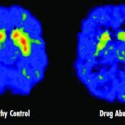Binge drinking may damage teens’ brains
When teens go on a binge drinking episode, they may be doing serious damage to the sensitive “white matter” in their brain, a new MRI-based study suggests.
White matter is involved in relaying information between brain cells, the researchers said. This means that damage caused to the developing brain by bouts of heavy drinking could affect thinking and memory, even lowering school performance.
Although white matter impairment has been seen in the brains of adult alcoholics, “we were somewhat surprised that these adolescents who had histories of binge drinking showed significantly poorer quality of their white matter,” said lead researcher Susan F. Tapert, an associate professor of psychiatry at the University of California, San Diego, and director of Substance Abuse/Mental Illness at the VA San Diego Healthcare System.
The cause of the damage is not fully understood, Tapert said. “It could be that episodes of binge drinking during the teenage years, when their brain is still developing, could have adversely influenced the brain’s white matter development,” she said.
Heavy drinking among adolescents remains a major problem, Tapert said. About 55 percent of high school seniors report having been drunk, and 25 percent say they have had five or more drinks on at least one day over the past two weeks, she said. That means that “a quarter of our high school seniors could be at risk for these kind of problems,” the researcher believes.
The report was published in the April 22 online edition of Alcoholism: Clinical and Experimental Research.
For the study, Tapert’s team used a type of MRI imaging called diffusion tensor imaging to look at the brains of 28 teenagers. Among these individuals, 14 had a history of binge drinking, which is defined as having consumed four to five drinks in a day. Although some of the teens had a history of binge drinking, they did not meet the criteria for alcohol abuse or alcoholism, the researchers noted.
According to the MRI scans, teens with a history of binge drinking showed damage to their brain’s white matter — specifically, a lower “coherence” of white matter fibers, which suggests poorer white matter health, Tapert said.
White matter is a main part of the central nervous system and is necessary for passing messages between different areas of gray matter within the nervous system.
Tapert noted that if this damaged white matter was just an image on a scan, it wouldn’t be a problem. “But we have seen in other studies reductions in thinking and memory ability in adolescents who had histories of heavy drinking,” she said.
In those studies, teens with a history of heavy drinking retrieved about 10 percent less information compared with teens who were not binge drinkers, Tapert said. “We have also seen that if you start drinking heavily in adolescence, you are more likely to go downhill on other measures of thinking and information processing,” she said.
Although this study is only a snapshot of a small number of teens, Tapert takes the results seriously. “I feel compelled to make sure my son is not getting involved with drinking as he moves into the adolescent years,” she said.
Dr. John R. Knight, an associate professor of pediatrics at Harvard Medical School and director of the Center for Adolescent Substance Abuse Research, Children’s Hospital Boston, agreed.
“This is further evidence of the deleterious effects of heavy drinking on the developing adolescent brain,” Knight said. “There is a growing body of scientific evidence on alcohol-related neurotoxicity, as well as evidence that brain development continues well into the third decade of life,” he said.
The findings also have important policy implications, Knight said.
“We strongly recommend not lowering the legal drinking age, as some well-intentioned — but very misguided — college presidents have recently advocated. We do not strive to deprive teens and young adults, only to protect their futures,” he said.
source: 21 News Now
